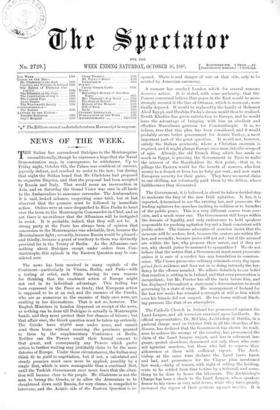The Government, it is believed, is about to take a
decided step to moderate the fury of the new Irish agitation. It has, it is reported, determined to use the existing law, and prosecute the leading agitators for speeches inciting to sedition or to breaches of the public peace. This is a very different course from coer- cion, and a much wiser one. The Government still keeps within the domain of legality, and only endeavours to hold speakers responsible for pushing agitation beyond a limit consistent with public order. The furious advocates of coercion insist that the measure will be useless, first, because the orators are within the law, and secondly, because juries will not act ; but if the accused are within the law, why propose their arrest, and if they are not, why should juries be assumed to sympathise ? We do not believe that the notion that a Government must never prosecute unless it is sure of a verdict has any foundation in common- sense. The Crown prosecutes ordinary criminals every day upon prrinui facie evidence, and does not in so doing intensify the ten- dency to the offence assailed. We adhere definitely to our belief that reaction is setting in in Ireland, and that even prosecution is inexpedient ; but Mr. Forster has all the facts before him, and has displayed throughout a statesman's determination to avoid governing by a state of siege. His management of Ireland for the last few weeks has revealed a strength of will in him which even his friends did not suspect. He has borne without flinch- ing pressure like that of an atmosphere.


































